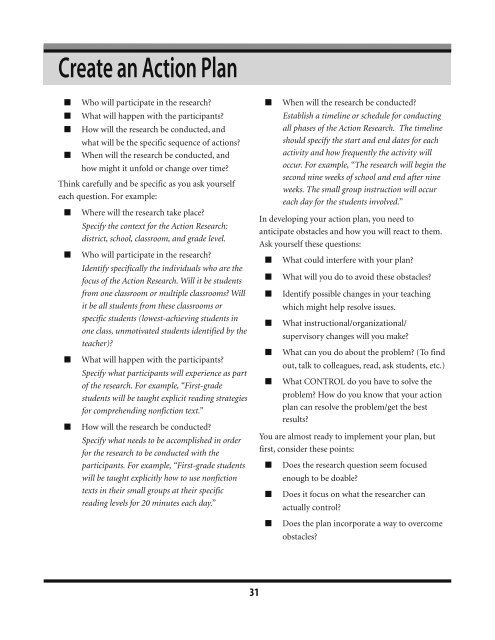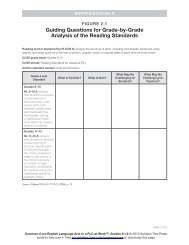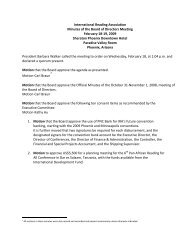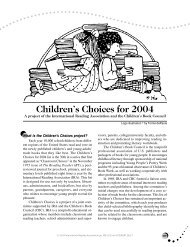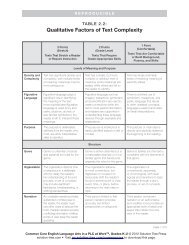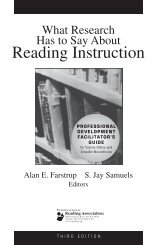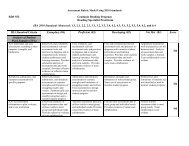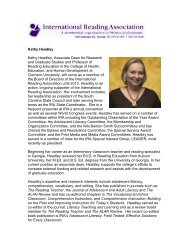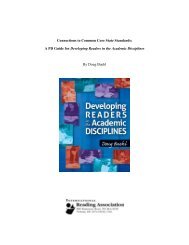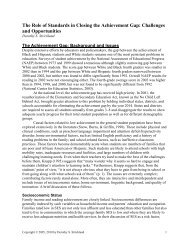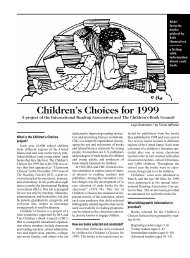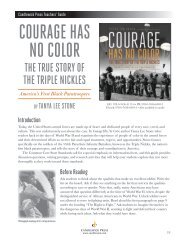A Practical Guide to Action Research for Literacy Educators
A Practical Guide to Action Research for Literacy Educators
A Practical Guide to Action Research for Literacy Educators
Create successful ePaper yourself
Turn your PDF publications into a flip-book with our unique Google optimized e-Paper software.
Create an <strong>Action</strong> Plan<br />
■<br />
■<br />
■<br />
■<br />
Who will participate in the research?<br />
What will happen with the participants?<br />
How will the research be conducted, and<br />
what will be the specific sequence of actions?<br />
When will the research be conducted, and<br />
how might it unfold or change over time?<br />
Think carefully and be specific as you ask yourself<br />
each question. For example:<br />
■<br />
■<br />
■<br />
■<br />
Where will the research take place?<br />
Specify the context <strong>for</strong> the <strong>Action</strong> <strong>Research</strong>:<br />
district, school, classroom, and grade level.<br />
Who will participate in the research?<br />
Identify specifically the individuals who are the<br />
focus of the <strong>Action</strong> <strong>Research</strong>. Will it be students<br />
from one classroom or multiple classrooms? Will<br />
it be all students from these classrooms or<br />
specific students (lowest-achieving students in<br />
one class, unmotivated students identified by the<br />
teacher)?<br />
What will happen with the participants?<br />
Specify what participants will experience as part<br />
of the research. For example, “First-grade<br />
students will be taught explicit reading strategies<br />
<strong>for</strong> comprehending nonfiction text.”<br />
How will the research be conducted?<br />
Specify what needs <strong>to</strong> be accomplished in order<br />
<strong>for</strong> the research <strong>to</strong> be conducted with the<br />
participants. For example, “First-grade students<br />
will be taught explicitly how <strong>to</strong> use nonfiction<br />
texts in their small groups at their specific<br />
reading levels <strong>for</strong> 20 minutes each day.”<br />
■<br />
When will the research be conducted?<br />
Establish a timeline or schedule <strong>for</strong> conducting<br />
all phases of the <strong>Action</strong> <strong>Research</strong>. The timeline<br />
should specify the start and end dates <strong>for</strong> each<br />
activity and how frequently the activity will<br />
occur. For example, “The research will begin the<br />
second nine weeks of school and end after nine<br />
weeks. The small group instruction will occur<br />
each day <strong>for</strong> the students involved.”<br />
In developing your action plan, you need <strong>to</strong><br />
anticipate obstacles and how you will react <strong>to</strong> them.<br />
Ask yourself these questions:<br />
■<br />
■<br />
■<br />
■<br />
■<br />
■<br />
What could interfere with your plan?<br />
What will you do <strong>to</strong> avoid these obstacles?<br />
Identify possible changes in your teaching<br />
which might help resolve issues.<br />
What instructional/organizational/<br />
supervisory changes will you make?<br />
What can you do about the problem? (To find<br />
out, talk <strong>to</strong> colleagues, read, ask students, etc.)<br />
What CONTROL do you have <strong>to</strong> solve the<br />
problem? How do you know that your action<br />
plan can resolve the problem/get the best<br />
results?<br />
You are almost ready <strong>to</strong> implement your plan, but<br />
first, consider these points:<br />
■<br />
■<br />
Does the research question seem focused<br />
enough <strong>to</strong> be doable?<br />
Does it focus on what the researcher can<br />
actually control?<br />
■<br />
Does the plan incorporate a way <strong>to</strong> overcome<br />
obstacles?<br />
31


